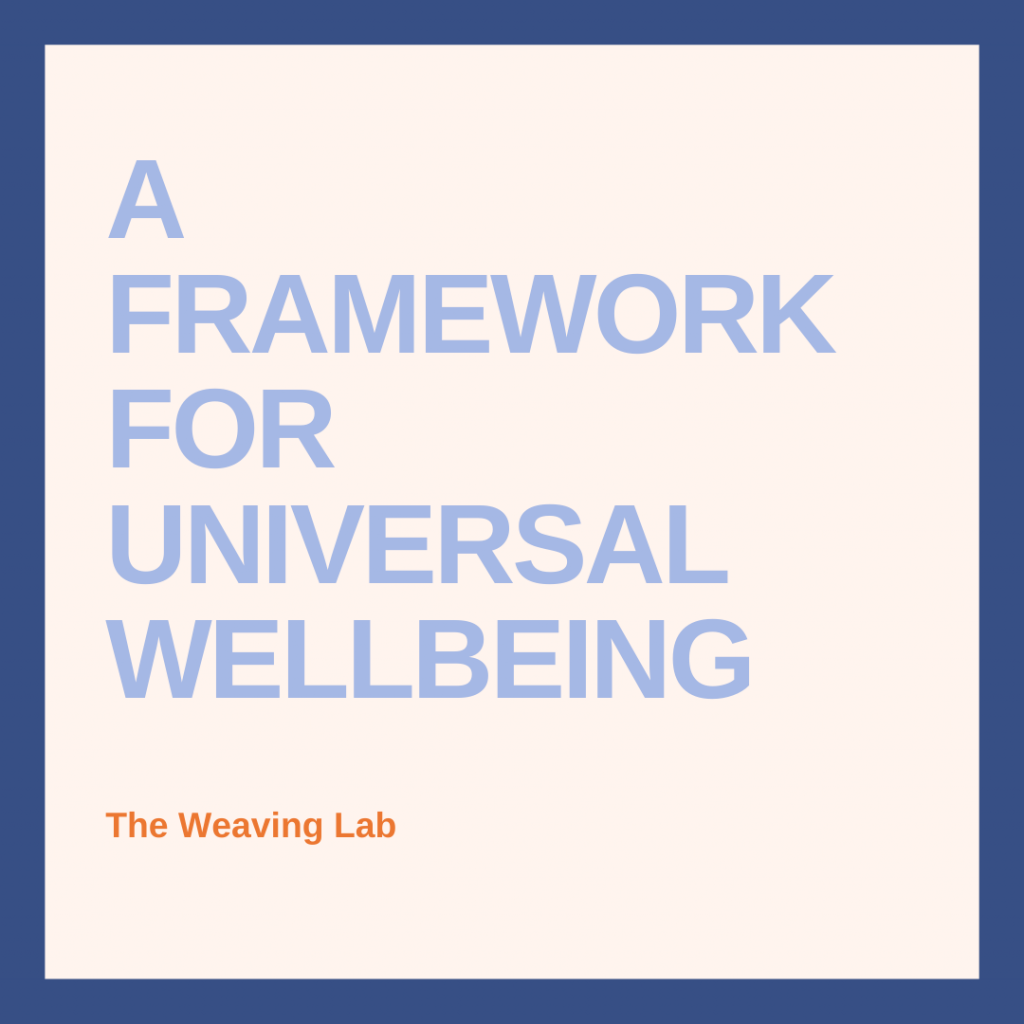A note from the Editor: What follows is generously brought to you by The Weaving Lab and taken directly from their Framework for Universal Well Being. You can download the full document on their site, or HERE at NW.com.
INTRODUCTION
The Weaving Lab is a global community of weavers and other change leaders who are weaving empowering ecosystems for universal wellbeing.
Our central beliefs are:
• Universal wellbeing is humanity’s deepest purpose and highest aspiration
• Everyone should be empowered (equipped and inclined) to live for universal wellbeing (to practice changemaking)
• Living for universal wellbeing means choosing and acting, from moment to moment, to achieve the optimal balance between the wholly interdependent and ever-fluctuating variables that constitute personal, socio-economic and planetary wellbeing
• Every human system should have Universal Wellbeing as its central purpose – and be thought of as an empowering learning ecosystem (a system which, through the choices and actions of those in the system, senses and improves itself continuously)
• To create and improve any empowering learning ecosystem that is directed towards Universal Wellbeing, a critical mass of people in the system need to be consciously and continuously weaving change
Our mission is to weave a global learning ecosystem of weavers who are advancing the profession and practice of weaving thriving learning ecosystems.
Weaving involves:
• Aligning people: To a shared vision and values
• Fostering collaborations: Organising for collective impact
• Thinking and acting systemically
• Being a better system
To achieve our mission, we have developed this Framework to guide and inform our own work and to support change leaders anywhere in weaving empowering learning ecosystems.
Our hope is that this Framework will be used as:
• A rigorous line of enquiry for creating clarity (individually and within groups)
• A departure-point for conversation, reflection and learning
• A structure for organising and sharing stories and evidence
The Framework would not have come about without the contributions from change leaders around the world. Informed by thousands of conversations with some of the world’s most visionary thinkers and practitioners, it has been impossible to find words that perfectly accommodate everyone’s unique perspective or chosen language. The Framework should be read, therefore, as a synthesis of interconnected and overlapping ideas, and as a work in progress that will improve with constructive critique.
THE FRAMEWORK
1. UNIVERSAL WELLBEING
What does it mean to thrive?
2. THRIVING IN THE NEW WORLD
What do we have to contend with to move towards Universal Wellbeing?
3. BEING WELL AND DOING GOOD
How does human action influence Universal Wellbeing?
4. BEING EMPOWERED TO PRACTICE CHANGEMAKING
What does it mean to live for Universal Wellbeing?
5. BECOMING EMPOWERED TO PRACTICE CHANGEMAKING
How do people become empowered to live for Universal Wellbeing?
6. EMPOWERING LEARNING ECOSYSTEMS
What systemic changes are necessary to empower everyone to live for Universal Wellbeing?
7. WEAVING EMPOWERING LEARNING ECOSYSTEMS
How will systems change?
1. UNIVERSAL WELLBEING
What does it mean to thrive?
1.1. Our deepest purpose and highest aspiration: Wellbeing, quality of life, flourishing, and thriving.
1.2. Interconnectedness and interdependence: Personal, socio-economic and planetary wellbeing together
1.3. Personal wellbeing
- 1.3.1. Health (physical and mental)
- 1.3.2. Safety and security
- 1.3.3. Calm and comfort
- 1.3.4. Autonomy, freedom and competence
- 1.3.5. Self-esteem
- 1.3.6. Achievement and personal growth
- 1.3.7. Purpose and meaning
- 1.3.8. Hope and optimism
- 1.3.9. Understanding and feeling understood
- 1.3.10. Feeling interested
- 1.3.11. Playing
- 1.3.12. Caring and feeling cared for
- 1.3.13. Loving and feeling loved
- 1.3.14. Intimacy and sex
- 1.3.15. Belonging and respect
- 1.3.16. Being fairly treated
- 1.3.17. Appreciation and wonder
- 1.3.18. Happiness
1.4. Socio-economic wellbeing
- 1.4.1. Family, friends, community, relationships
- 1.4.2. Social systems
- 1.4.3. Work, money and standard of living
- 1.4.4. Rights, laws and social norms
1.5. Planetary wellbeing
- 1.5.1. Sustainability
- 1.5.2. Regeneration
2. THRIVING IN THE NEW WORLD
What do we have to contend with to move towards Universal Wellbeing?
2.1. The state of the world
2.2. Volatility, uncertainty, complexity and ambiguity
2.3. Mass distribution and mass participation
2.4. AI, automation and the 4th industrial revolution
2.5. Hyper-connectivity
2.6. New consciousness
3. BEING WELL AND DOING GOOD
How does human action influence Universal Wellbeing?
3.1. The consequences of human action: Everyone shapes the world
3.2. Intention, choosing, deciding, acting and behaviour
- 3.2.1. Consciousness, the unconscious and agency
- 3.2.2. Motivation
- 3.2.3. Emotions, moods and feelings
- 3.2.4. Needs and wants
- 3.2.5. Beliefs and values
- 3.2.6. Cognitive biases
- 3.2.7. Memory, self-identity and ego
4. BEING EMPOWERED TO PRACTICE CHANGEMAKING
What does it mean to live for Universal Wellbeing?
4.1. Being empowered: Knowledge, skills, attitudes, values, competences, qualities and potentialities
4.2. Being empowered: Ways of being 4.2.1. Being empathic and compassionate
- 4.2.2. Being self-aware and self-controlled
- 4.2.3. Being present, attentive and mindful
- 4.2.4. Being reflective and future-minded
- 4.2.5. Being helpful, kind and generous
- 4.2.6. Being open-minded, flexible and fair-minded
- 4.2.7. Being collaborative
- 4.2.8. Being communicative, assertive and civil
- 4.2.9. Being tolerant, patient and forgiving
- 4.2.10. Being courageous
- 4.2.11. Being resilient
- 4.2.12. Being conscientious, organised and efficient
- 4.2.13. Being proactive
- 4.2.14. Being possibility-minded
- 4.2.15. Being responsible
- 4.2.16. Being authentic, sincere and honest
- 4.2.17. Being adaptable, curious and growth-minded
- 4.2.18. Being imaginative, creative and resourceful
- 4.2.19. Being reasonable, critical and questioning
- 4.2.20. Being thoughtful, ethical and wise
5. BECOMING EMPOWERED TO PRACTICE CHANGEMAKING
How do people become empowered to live for Universal Wellbeing?
5.1. Being, becoming and learning
5.2. Genetics, personality, neuroplasticity and experience
5.3. Empowering learning experiences
- 5.3.1. Practicing changemaking daily
- 5.3.2. Reflecting on practice and progress
- 5.3.3. Being trusted to take the lead
- 5.3.4. Working in the community
- 5.3.5. Doing projects that are self-directed, collaborative, immersive, experiential, interdisciplinary, and challenge-based
- 5.3.6. Being in nature
- 5.3.7. Using technology
- 5.3.8. Exploring the sustainable development goals
- 5.3.9. Debating the state of the world
- 5.3.10. Questioning the status quo
- 5.3.11. Exploring and celebrating diversity
- 5.3.12. Practicing peace-making
- 5.3.13. Playing, making art and telling stories
- 5.3.14. Discussing holistic human development
- 5.3.15. Practicing meditation and mindfulness
5.4. Monitoring and measuring progress
6. EMPOWERING LEARNING ECOSYSTEMS
What systemic changes are necessary to empower everyone to live for Universal Wellbeing?
6.1. 1st line actors directly influence the experience of others
6.2. 2nd line actors indirectly influence the experience of others
6.3. Collaboration at every scale is essential
6.4. Complex systemic changes are required
6.5. Changing systemic mechanisms and mindsets
- 6.5.1. Building trust, enhancing communication, raising voices
- 6.5.2. Creating new roles, empowering every actor
- 6.5.3. Building capacity in the system
- 6.5.4. Changing progression routes and incentives
- 6.5.5. Changing policies
- 6.5.6. Shifting funding
- 6.5.7. Applying technologies
- 6.5.8. Changing measures
- 6.5.9. Redefining success
- 6.5.10. Shifting mindsets and behaviours
7. WEAVING EMPOWERING LEARNING ECOSYSTEMS
How will systems change?
7.1. Everyone contributes to change
7.2. Change leaders lead the way
7.3. Vibrant communities and effective teams will be crucial
7.4. Change leaders must align, collaborate and act systemically
7.5. Weaving is essential to continuous change 7.5.1. Aligning communities to a shared North Star
- 7.5.2. Fostering collaborations and organising
- 7.5.3. Weaving involves building conversations and demand
featured image found at ssir.org
The Weaving Lab trains leaders, cultivates research, builds networks and advises organisations working to weave thriving communities.
The Weaving Lab is growing the field of weaving – deepening its practice, advancing research, and strengthening the community of practitioners – so that together, we can effect systems change that enable people and planet thrive.
PLEASE DONATE to help Network Weaver continue in it’s mission to offer free support and resources to networks worldwide.

